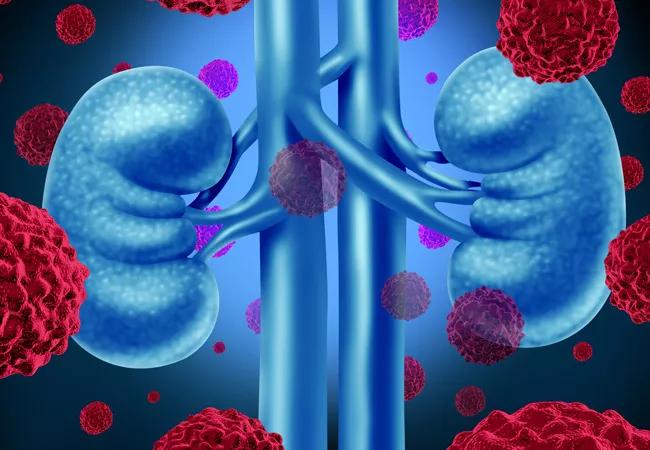Positive results point to a better prognosis for intractable disease

Image content: This image is available to view online.
View image online (https://assets.clevelandclinic.org/transform/7849544d-3987-434d-9555-9f3a73875b91/renal-cell-cance_650x450_jpg)
renal-cell-cance_650x450
Kidney cancer is one of the ten most common cancers in both men and women, representing 3.8 percent of all new cancer cases. The overall five-year kidney cancer survival rate is 74 percent, ranging from 92.6 percent for localized cancer to 11.8 percent for distant cancer. However, the prospects for metastatic kidney cancer may be improving: a recently completed multicenter phase 3 study showed promising results for a new combination therapy. Cleveland Clinic was a member of the study, which was presented at the 2018 Genitourinary Cancers Symposium.
Advertisement
Cleveland Clinic is a non-profit academic medical center. Advertising on our site helps support our mission. We do not endorse non-Cleveland Clinic products or services. Policy
Over the past decade, the RCC treatment landscape has undergone a major evolution: moving from cytokine-based immunotherapy to targeted therapy against vascular endothelial growth factor (VEGF) to today’s focus on novel immunotherapy agents. As a cancer with immunogenic properties, RCC has responded well to immunotherapy, which is a fertile area for further drug development. “We are in the midst of another transition in RCC treatment with the advances in immunologic drugs,” says Brian Rini, MD, who leads Cleveland Clinic Cancer Center’s Genitourinary Program.
This evolution in treatment has led to the approval of a number of agents that have shown therapeutic effects in patients with advanced RCC: They include molecules that target VEGF, platelet-derived growth factor (PDGF) and related receptors; and inhibitors of other factors such as the mammalian target of rapamycin (mTOR).
The current standard of care for metastatic RCC (mRCC) is treatment with the anti-VEGF drugs pazopanib and sunitinib, which also inhibit PDGF and other kinases. Despite these new treatments, progress in treating advanced RCC has been limited. “There will be a need for more effective therapies until we are curing 100 percent of patients,” says Dr. Rini.
The randomized phase 3 study compared treatment with sunitibib to a combination therapy of two active drugs that may complement each other: the anti-VEGF drug bevacizumab and atezolizumab, an engineered monoclonal antibody against the protein programmed cell death-ligand 1 (PD-L1), which is expressed on some RCC tumor and immune cells. Clinical trials are currently underway testing atezolizumab as an immunotherapy for several types of solid tumors.
Advertisement
The 915 study participants were mRCC patients who had not received prior systemic active or experimental therapy, either in the adjuvant or metastatic setting. They were stratified according to their PD-L1 expression on tumor-infiltrating immune cells: 40 percent were PD-L1 positive. Over 15 months, the participants who received bevacizumab/atezolizumab had a longer progression-free survival (PFS) than the sunitibib group: 11.2 months compared with 8.4 months. The drug combination was well-tolerated, with safety consistent with that of the individual agents, and FDA approval is pending.
“This study is a step forward in our search for more effective treatments for advanced kidney cancer. The preliminary results are positive but it will take more time to learn whether these drugs significantly extend survival,” says Dr. Rini.
Advertisement
Advertisement
Combination therapy improves outcomes, but lobular patients still do worse overall than ductal counterparts
Bringing empathy and evidence-based practice to addiction medicine
Supplemental screening for dense breasts
Combining advanced imaging with targeted therapy in prostate cancer and neuroendocrine tumors
Early results show strong clinical benefit rates
The shifting role of cell therapy and steroids in the relapsed/refractory setting
Radiation therapy helped shrink hand nodules and improve functionality
Standard of care is linked to better outcomes, but disease recurrence and other risk factors often drive alternative approaches